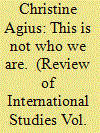| Srl | Item |
| 1 |
ID:
183717


|
|
|
|
|
| Summary/Abstract |
The Trump presidency ushered in a heightened sense of ontological insecurity in the US, based on a national self-narrative that portrayed an emasculated America. Trump promised to return the US to primacy by pursuing policies and practices that focused on border protection, militarisation, and the vilification of external others, while amplifying racial tensions within the country. From caging immigrant children at the border, to an enabling of white supremacy and the Capitol riots, Trump's presidency was broadly seen as aberration in the self-narrative of America as a tolerant, democratic nation. In this article, I am interested in how gendered bordering practices inform ontological (in)security in Trump's narrative of the nation, domestic and external policy, and discourses. While Trump's electoral loss to Biden in 2020 has been described as a ‘return to normal’, this article instead considers how Trump's presidency exhibited lines of continuity when examined through a gender lens. Understanding how masculinism informs ideas of ontological security reveals how notions of gendered bordering, hierarchy, and ordering have been persistent threads in US politics, rather than simply an anomaly under Trump. This suggests greater potential to read ontological security in more complex terms through gendered bordering practices.
|
|
|
|
|
|
|
|
|
|
|
|
|
|
|
|
| 2 |
ID:
188989


|
|
|
|
|
| Summary/Abstract |
Zoonotic pandemics shine an uncomfortable light on how human lifeways facilitate the sharing of pathogens across species. Yet our lack of acknowledgement of our shared vulnerability with those non-human animals we raise or hunt to kill and eat, whose habitats we encroach upon and destroy, whose populations we undermine and threaten, has led us to the current human health crisis. The predominant political response to zoonotic pandemic has been bordering practices of surveillance, securitisation and bodily separation. These practices reflect intra-human and species hierarchies. They also fail to acknowledge the extent to which the boundaries of species are leaky, and are continually breached. A posthumanist zoonotic politics seeks not to attempt to border the leaky boundaries of species, but rather to insist on a re-ordering of species relations towards less exploitative and extractive ways of sharing the planet with the myriad creatures that constitute our world.
|
|
|
|
|
|
|
|
|
|
|
|
|
|
|
|